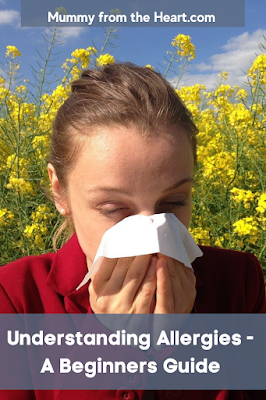{This is a paid collaboration with Klarify}
It's reported that over 20% of the UK population is affected by one or more allergy (1) nowadays. I find this a staggering figure and the growth has been rapid over the last few decades. I suspect none of us have managed to go through life without being impacted by allergies. One of my earliest memories is of my Nan being stung by a bee whilst we were shopping on a summers day. Within 30 minutes we were calling an ambulance for her as she had gone into analphaltic shock. It was a scary experience that has stayed with me and reminded me never to underestimate the potential severity of allergies.
I, personally, had manged to live an allergy free life until I was 41 and developed asthma; my GP and I believe this was bought on by the gasses and pollen emitted from the rape seed fields that I had moved close to and decided to take a walk though to appreciate their beauty. Even with a pretty mild case of intermittent asthma I've realised that there are life changing implications of having allergies.
What is an allergy?
You can go through most of your life allergy-free and then all of a sudden your immune system is exposed to something new and it becomes sensitised and can go on to evelop an allergy. Simply put, an allergy is an overreaction of your immune system to a substance that is normally harmless. The first time you are exposed to this substance, that we'll now refer to as an allergen, your immune system memorises the particular structure of the allergen so that it can produce specific IgE antibodies in defence. This is called sensitisation.
Each time in the future that your body is exposed to this allergen it will produce IgE and some people can go through life sensitised to a substance/ allergen but never experience any symptoms and thus it is not an allergy, as they don't have any outward or adverse impact to being sensitised. Other people will have symptoms and thus they have an allergy. Your allergies can flare u and subside throughout your life.
Are allergies hereditary?
There is no evidence to show that allergies will pass from one generation to the next, but there is evidence to suggest that if one member of a family suffers from allergies, others may too. So it is the tendency to develop an allergy that seems hereditary, rather than the actual passing on of allergies.
Do all allergies have the same symptoms?
Of course, we all know people with all types of allergies, some far more severe than others but I never realised that where your allergy shows its symptoms is where your body has the immune reaction to it, for example, you'll have sneezing or a runny nose with a nose reaction, dry or itchy skin with a skin reaction, bloating, gut pain or maybe diarrhoea with a food allergy felt in the stomach or in my case wheezing and coughing with a reaction in the chest to the allergens.
So, no, not all allergies give the same symptoms but many will present similarity and can thus be confusing.
How do you diagnose the allergen?
This is where it becomes complex. You'll know where you are feeling the symptoms and this might give you a clue, for instance if your issues are felt in yoru gut it is probably a food allergy but then you have the difficult job of pinning down which food is causing the irritation. One easy way of finding out what allergens you are sensitised to, is by doing a simple home allergy test. You can buy a complete kit from Klarify, and with precise instructions you'll extract about 6 drops of blood to send off to their laboratory for full analysis. Within a few weeks you'll have online results that you can discuss with yoru doctor and agree a good way forward. There are lots of useful articles on the Klarify site and you can find out more about allergy blood tests, travelling with allergies, hay fever or symptom relivers, to name just a few articles.
Types of allergies
Allergies can be categorised into a few areas -
- Allergic skin reactions, such as hives or eczma
- Respiratory allergies such as asthma, hay fever or pollen allergy
- Food allergies, some of which like gluten and lactose are becoming more common and some like shellfish and peanuts can be very severe and even life-threatening
- Drug allergies - primarily to antibiotics
- Insect sting allergies, when your body reacts to the venom the insect stings into you. Reactions to these can be very severe and cause anaphylaxis
- Latex or sticking plaster allergies
What's analphaltic shock?
This is a very severe and potentially life-threatening reaction by the immune system to a detected allergen. The most frequent triggers are insect stings, food such as shellfish and nuts and certain drugs. The response can be almost instantaneous and it is important that the person gets help straight away. If they know they have a serious allergy they should be carrying two adrenaline auto-injectors with them.
As soon as they feel the first symptom it's important to use the auto-injector and call 999 for professional help. They can either inject themselves or you can if you know what you're doing and it is important to stay with them until the paramedics arrives.
Want to know more?
It's easy to dismiss an allergy as a small factor but for some people it is life changing and can cause a multitude of issues. Why not check out my recent post with tips for living successfully with your allergies and if you're interested to find out more, there are so many good sources of information out there. I'd recommend Allergy.uk as a great starting place.
Why not pin this post for later?
Sources
(1) https://www.allergyuk.org/information-and-advice/statistics












ReplyDeleteI have never suffered from allergies but after having developed that cross dust / shellfish I suffer a lot at the change of season, especially in spring!
my husband and sister have Food allergies and the symptom sometimes get bad!
ReplyDelete